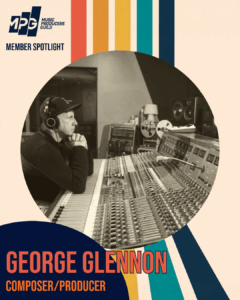 How would you define your main role on most of the projects you work on at the moment?
How would you define your main role on most of the projects you work on at the moment?
I’m involved in the forward development of a feature film based on a proof-of-concept financial crime thriller short film I wrote and directed. My role in the music for this film as supervisor and studio producer/composer is the all-encompassing management of this process.
Please tell us about your musical background. How did you get started in the music industry? What was your pathway to your current role?
I was born into a famous dance school that my mother (an iconic dance teacher) founded. Surrounded by the classical music of the ballet, and the jazz and popular music of the day since the day I was born, the studio pianist became my first piano teacher, at age five. Billy Joel’s breakthrough work in the late 70’s heavily influenced me. I had written a complete album by age nineteen, and went to New York to meet Phil Ramone.
After discovering Mike Stone’s stunning production work with Asia and Journey, I wanted to learn how to make records. I trained as a recording engineer at “The Cars” Synchro Sound Studios in Boston. I then came to London to start meeting people, working with young artists, getting in the studio, and following the path of my heroes. Richard Branson, who then ran the Virgin Music Group of companies, was one of the first people I relentlessly sought out and met in London.
Who inspired you to follow this path?
Mike Stone is the reason I wanted to learn how to make records. Most of you know Mike as the engineer who stacked Queen’s vocals on Bohemian Rhapsody for Roy Thomas Baker, but his influence on me had to do with the massive Asia and Journey albums he produced. I had to find out how these albums were made, and this drove me to London to find out. Unfortunately, Mike died at a young age, but I did get to meet him when he was making an album for Foreigner at Criteria in Miami.
Additionally Quincy Jones, Phil Ramone, Brian Wilson, Burt Bacharach. I’ve also been very fortunate to meet and know George Martin and Robin Millar, who were very encouraging and generous to me when I was first making progress.
Are there any highlights from your work that you are particularly proud of?
The fact that I’ve been able to get a film off the ground and in forward development as a feature film. This was never a dream or goal, it happened organically. Music is a very large part of this film driving action on screen.
The musical thinking surrounding a film is different than making a normal record. It is bigger, and there are many more people involved. I’m lucky to be working with world-class talent and I wouldn’t want to be doing this anywhere else but in London.
What tip can you share with other MPG members to help their workflow?
Don’t try to be a jack-of-all-trades. If you’re trying to do world-class work, you need to know your strengths and limitations, and when to bring in people that are better than you at a particular task. Quincy used to say “Check your ego at the door.”
What one tip would you like an MPG member to share with you?
Brutal and honest feedback is the most valuable help we can give each other. It’s invaluable to have a professional feedback loop that can be trusted to give you an honest opinion on your work-in-progress or decisions you have to make.
Over the years the MPG has always been there for me. Years ago I was showcasing a girl group I had developed, to the president of Columbia Records. Robin Millar spent a whole afternoon going over the songs with me and giving me advice. You can’t replicate that type of trusted advice/ learning from a legend that has been through it. Most recently, I got Tommy Danvers trusted advice on a decision I’m making on a phenomenal young singer.
Do you have any words of wisdom for people wanting to get into a similar music
production role to yours?
Take risks. If you’re comfortable then get uncomfortable. I’ll quote Richard Russell here. “Create in a vacuum and don’t follow trends.”
Be authentic to who you are musically whether it is in-vogue or not. Something that is completely organic, unique, and original, can only come from authenticity.
Remember what Dick Rowe said about The Beatles? “It will never work”. They said Sade was too jazzy, it would never work. Then she sold 35-million albums.
Shania/Mutt Lange, “A crazy idea, how can this possibly work?” 30-million albums later…
Madonna, Adele? They could never be anything but true to themselves. These artists all have a singular unwavering artistic point of view that is all their own from day one.
You’re not going to find artists like this on TikTok. I know a promising young artist with 500K followers on TikTok, with millions of views, that would have trouble selling out a 200-capacity
club.
A content creator and a recording artist are two completely different things. That is a hill I’ll die on.
The great Robin Millar has said, “We should be seeking out the poets, the alternates, the mystics, and the truly gifted.”
I hold myself to that standard. And no one said it was going to be easy.
Read more MPG Full Member Spotlight interviews